University Essay: Trauma Informed Care Practice Analysis
VerifiedAdded on 2023/01/19
|14
|4067
|54
Essay
AI Summary
This essay provides a comprehensive analysis of Trauma Informed Care Practice (TICP) in the context of a mental health case study involving a patient named Lisa. The essay begins with an introduction that emphasizes the importance of considering various factors, such as family support and medication history, in understanding a client's mental health needs. It then identifies key issues underlying Lisa's condition, including a lack of family support, untimely medication consumption, and withdrawal and relapse associated with cannabis use. The essay then integrates TICP principles to address these issues, focusing on peer support, collaboration, safety, and empowerment. It discusses how the mental health nurse can utilize these principles to develop a personalized recovery plan that includes family and peer-centered approaches, a personal and social safety plan, and a self-development plan. The essay concludes by highlighting the importance of individualized care, patient-centered approaches, and the application of TICP principles to improve patient outcomes. This document is a past paper contributed by a student on Desklib, a platform providing study tools for students.
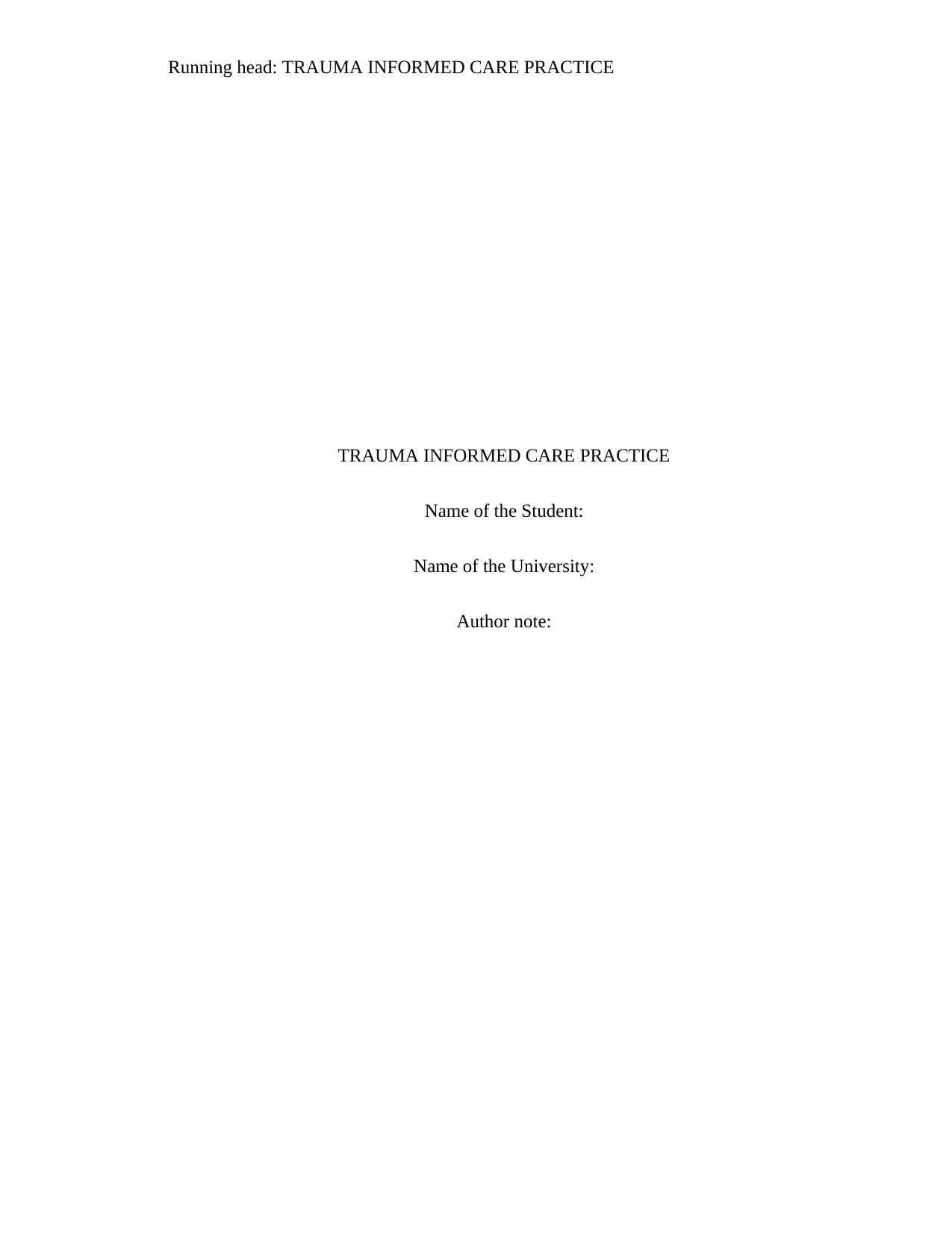
Running head: TRAUMA INFORMED CARE PRACTICE
TRAUMA INFORMED CARE PRACTICE
Name of the Student:
Name of the University:
Author note:
TRAUMA INFORMED CARE PRACTICE
Name of the Student:
Name of the University:
Author note:
Paraphrase This Document
Need a fresh take? Get an instant paraphrase of this document with our AI Paraphraser
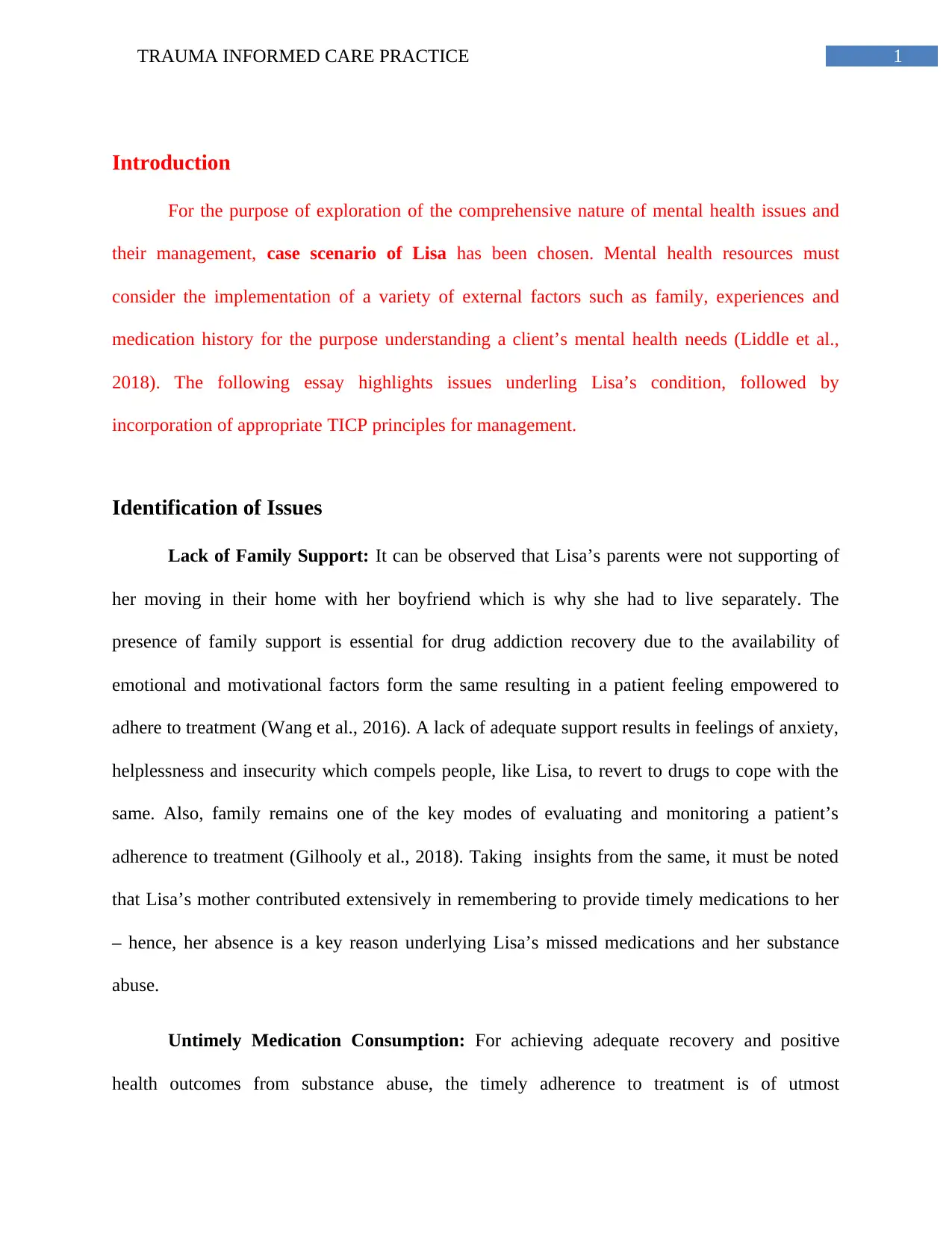
1TRAUMA INFORMED CARE PRACTICE
Introduction
For the purpose of exploration of the comprehensive nature of mental health issues and
their management, case scenario of Lisa has been chosen. Mental health resources must
consider the implementation of a variety of external factors such as family, experiences and
medication history for the purpose understanding a client’s mental health needs (Liddle et al.,
2018). The following essay highlights issues underling Lisa’s condition, followed by
incorporation of appropriate TICP principles for management.
Identification of Issues
Lack of Family Support: It can be observed that Lisa’s parents were not supporting of
her moving in their home with her boyfriend which is why she had to live separately. The
presence of family support is essential for drug addiction recovery due to the availability of
emotional and motivational factors form the same resulting in a patient feeling empowered to
adhere to treatment (Wang et al., 2016). A lack of adequate support results in feelings of anxiety,
helplessness and insecurity which compels people, like Lisa, to revert to drugs to cope with the
same. Also, family remains one of the key modes of evaluating and monitoring a patient’s
adherence to treatment (Gilhooly et al., 2018). Taking insights from the same, it must be noted
that Lisa’s mother contributed extensively in remembering to provide timely medications to her
– hence, her absence is a key reason underlying Lisa’s missed medications and her substance
abuse.
Untimely Medication Consumption: For achieving adequate recovery and positive
health outcomes from substance abuse, the timely adherence to treatment is of utmost
Introduction
For the purpose of exploration of the comprehensive nature of mental health issues and
their management, case scenario of Lisa has been chosen. Mental health resources must
consider the implementation of a variety of external factors such as family, experiences and
medication history for the purpose understanding a client’s mental health needs (Liddle et al.,
2018). The following essay highlights issues underling Lisa’s condition, followed by
incorporation of appropriate TICP principles for management.
Identification of Issues
Lack of Family Support: It can be observed that Lisa’s parents were not supporting of
her moving in their home with her boyfriend which is why she had to live separately. The
presence of family support is essential for drug addiction recovery due to the availability of
emotional and motivational factors form the same resulting in a patient feeling empowered to
adhere to treatment (Wang et al., 2016). A lack of adequate support results in feelings of anxiety,
helplessness and insecurity which compels people, like Lisa, to revert to drugs to cope with the
same. Also, family remains one of the key modes of evaluating and monitoring a patient’s
adherence to treatment (Gilhooly et al., 2018). Taking insights from the same, it must be noted
that Lisa’s mother contributed extensively in remembering to provide timely medications to her
– hence, her absence is a key reason underlying Lisa’s missed medications and her substance
abuse.
Untimely Medication Consumption: For achieving adequate recovery and positive
health outcomes from substance abuse, the timely adherence to treatment is of utmost
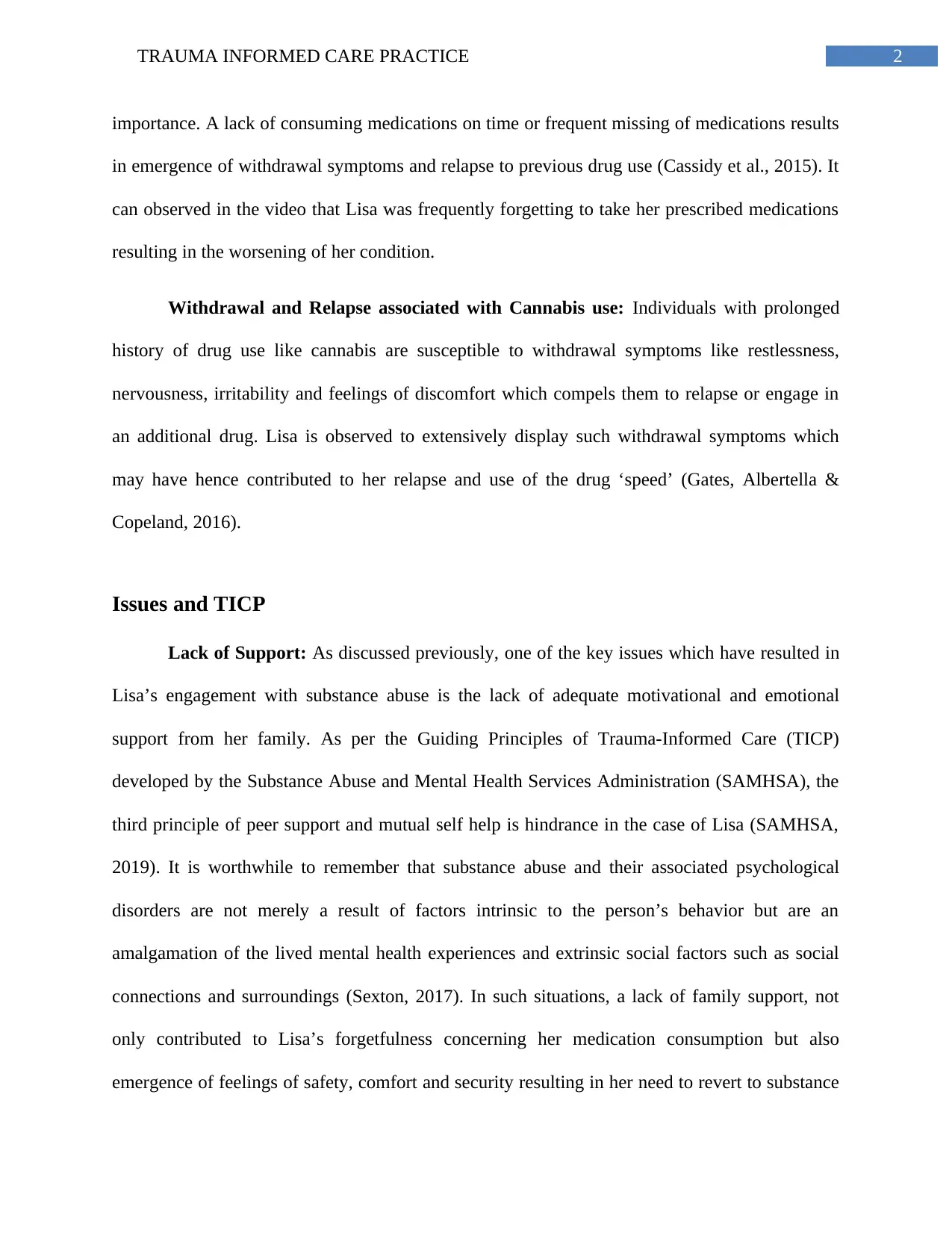
2TRAUMA INFORMED CARE PRACTICE
importance. A lack of consuming medications on time or frequent missing of medications results
in emergence of withdrawal symptoms and relapse to previous drug use (Cassidy et al., 2015). It
can observed in the video that Lisa was frequently forgetting to take her prescribed medications
resulting in the worsening of her condition.
Withdrawal and Relapse associated with Cannabis use: Individuals with prolonged
history of drug use like cannabis are susceptible to withdrawal symptoms like restlessness,
nervousness, irritability and feelings of discomfort which compels them to relapse or engage in
an additional drug. Lisa is observed to extensively display such withdrawal symptoms which
may have hence contributed to her relapse and use of the drug ‘speed’ (Gates, Albertella &
Copeland, 2016).
Issues and TICP
Lack of Support: As discussed previously, one of the key issues which have resulted in
Lisa’s engagement with substance abuse is the lack of adequate motivational and emotional
support from her family. As per the Guiding Principles of Trauma-Informed Care (TICP)
developed by the Substance Abuse and Mental Health Services Administration (SAMHSA), the
third principle of peer support and mutual self help is hindrance in the case of Lisa (SAMHSA,
2019). It is worthwhile to remember that substance abuse and their associated psychological
disorders are not merely a result of factors intrinsic to the person’s behavior but are an
amalgamation of the lived mental health experiences and extrinsic social factors such as social
connections and surroundings (Sexton, 2017). In such situations, a lack of family support, not
only contributed to Lisa’s forgetfulness concerning her medication consumption but also
emergence of feelings of safety, comfort and security resulting in her need to revert to substance
importance. A lack of consuming medications on time or frequent missing of medications results
in emergence of withdrawal symptoms and relapse to previous drug use (Cassidy et al., 2015). It
can observed in the video that Lisa was frequently forgetting to take her prescribed medications
resulting in the worsening of her condition.
Withdrawal and Relapse associated with Cannabis use: Individuals with prolonged
history of drug use like cannabis are susceptible to withdrawal symptoms like restlessness,
nervousness, irritability and feelings of discomfort which compels them to relapse or engage in
an additional drug. Lisa is observed to extensively display such withdrawal symptoms which
may have hence contributed to her relapse and use of the drug ‘speed’ (Gates, Albertella &
Copeland, 2016).
Issues and TICP
Lack of Support: As discussed previously, one of the key issues which have resulted in
Lisa’s engagement with substance abuse is the lack of adequate motivational and emotional
support from her family. As per the Guiding Principles of Trauma-Informed Care (TICP)
developed by the Substance Abuse and Mental Health Services Administration (SAMHSA), the
third principle of peer support and mutual self help is hindrance in the case of Lisa (SAMHSA,
2019). It is worthwhile to remember that substance abuse and their associated psychological
disorders are not merely a result of factors intrinsic to the person’s behavior but are an
amalgamation of the lived mental health experiences and extrinsic social factors such as social
connections and surroundings (Sexton, 2017). In such situations, a lack of family support, not
only contributed to Lisa’s forgetfulness concerning her medication consumption but also
emergence of feelings of safety, comfort and security resulting in her need to revert to substance
⊘ This is a preview!⊘
Do you want full access?
Subscribe today to unlock all pages.

Trusted by 1+ million students worldwide
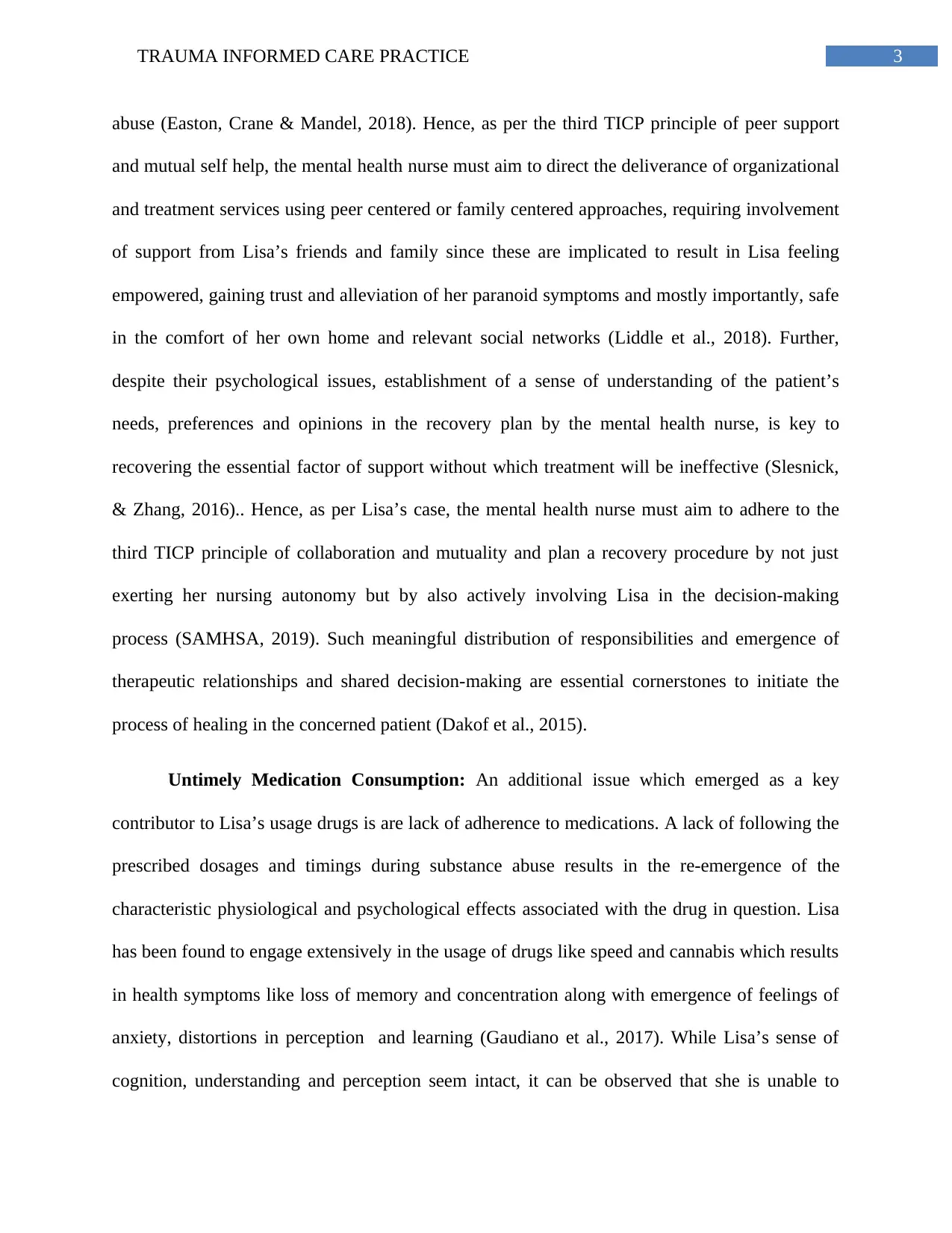
3TRAUMA INFORMED CARE PRACTICE
abuse (Easton, Crane & Mandel, 2018). Hence, as per the third TICP principle of peer support
and mutual self help, the mental health nurse must aim to direct the deliverance of organizational
and treatment services using peer centered or family centered approaches, requiring involvement
of support from Lisa’s friends and family since these are implicated to result in Lisa feeling
empowered, gaining trust and alleviation of her paranoid symptoms and mostly importantly, safe
in the comfort of her own home and relevant social networks (Liddle et al., 2018). Further,
despite their psychological issues, establishment of a sense of understanding of the patient’s
needs, preferences and opinions in the recovery plan by the mental health nurse, is key to
recovering the essential factor of support without which treatment will be ineffective (Slesnick,
& Zhang, 2016).. Hence, as per Lisa’s case, the mental health nurse must aim to adhere to the
third TICP principle of collaboration and mutuality and plan a recovery procedure by not just
exerting her nursing autonomy but by also actively involving Lisa in the decision-making
process (SAMHSA, 2019). Such meaningful distribution of responsibilities and emergence of
therapeutic relationships and shared decision-making are essential cornerstones to initiate the
process of healing in the concerned patient (Dakof et al., 2015).
Untimely Medication Consumption: An additional issue which emerged as a key
contributor to Lisa’s usage drugs is are lack of adherence to medications. A lack of following the
prescribed dosages and timings during substance abuse results in the re-emergence of the
characteristic physiological and psychological effects associated with the drug in question. Lisa
has been found to engage extensively in the usage of drugs like speed and cannabis which results
in health symptoms like loss of memory and concentration along with emergence of feelings of
anxiety, distortions in perception and learning (Gaudiano et al., 2017). While Lisa’s sense of
cognition, understanding and perception seem intact, it can be observed that she is unable to
abuse (Easton, Crane & Mandel, 2018). Hence, as per the third TICP principle of peer support
and mutual self help, the mental health nurse must aim to direct the deliverance of organizational
and treatment services using peer centered or family centered approaches, requiring involvement
of support from Lisa’s friends and family since these are implicated to result in Lisa feeling
empowered, gaining trust and alleviation of her paranoid symptoms and mostly importantly, safe
in the comfort of her own home and relevant social networks (Liddle et al., 2018). Further,
despite their psychological issues, establishment of a sense of understanding of the patient’s
needs, preferences and opinions in the recovery plan by the mental health nurse, is key to
recovering the essential factor of support without which treatment will be ineffective (Slesnick,
& Zhang, 2016).. Hence, as per Lisa’s case, the mental health nurse must aim to adhere to the
third TICP principle of collaboration and mutuality and plan a recovery procedure by not just
exerting her nursing autonomy but by also actively involving Lisa in the decision-making
process (SAMHSA, 2019). Such meaningful distribution of responsibilities and emergence of
therapeutic relationships and shared decision-making are essential cornerstones to initiate the
process of healing in the concerned patient (Dakof et al., 2015).
Untimely Medication Consumption: An additional issue which emerged as a key
contributor to Lisa’s usage drugs is are lack of adherence to medications. A lack of following the
prescribed dosages and timings during substance abuse results in the re-emergence of the
characteristic physiological and psychological effects associated with the drug in question. Lisa
has been found to engage extensively in the usage of drugs like speed and cannabis which results
in health symptoms like loss of memory and concentration along with emergence of feelings of
anxiety, distortions in perception and learning (Gaudiano et al., 2017). While Lisa’s sense of
cognition, understanding and perception seem intact, it can be observed that she is unable to
Paraphrase This Document
Need a fresh take? Get an instant paraphrase of this document with our AI Paraphraser
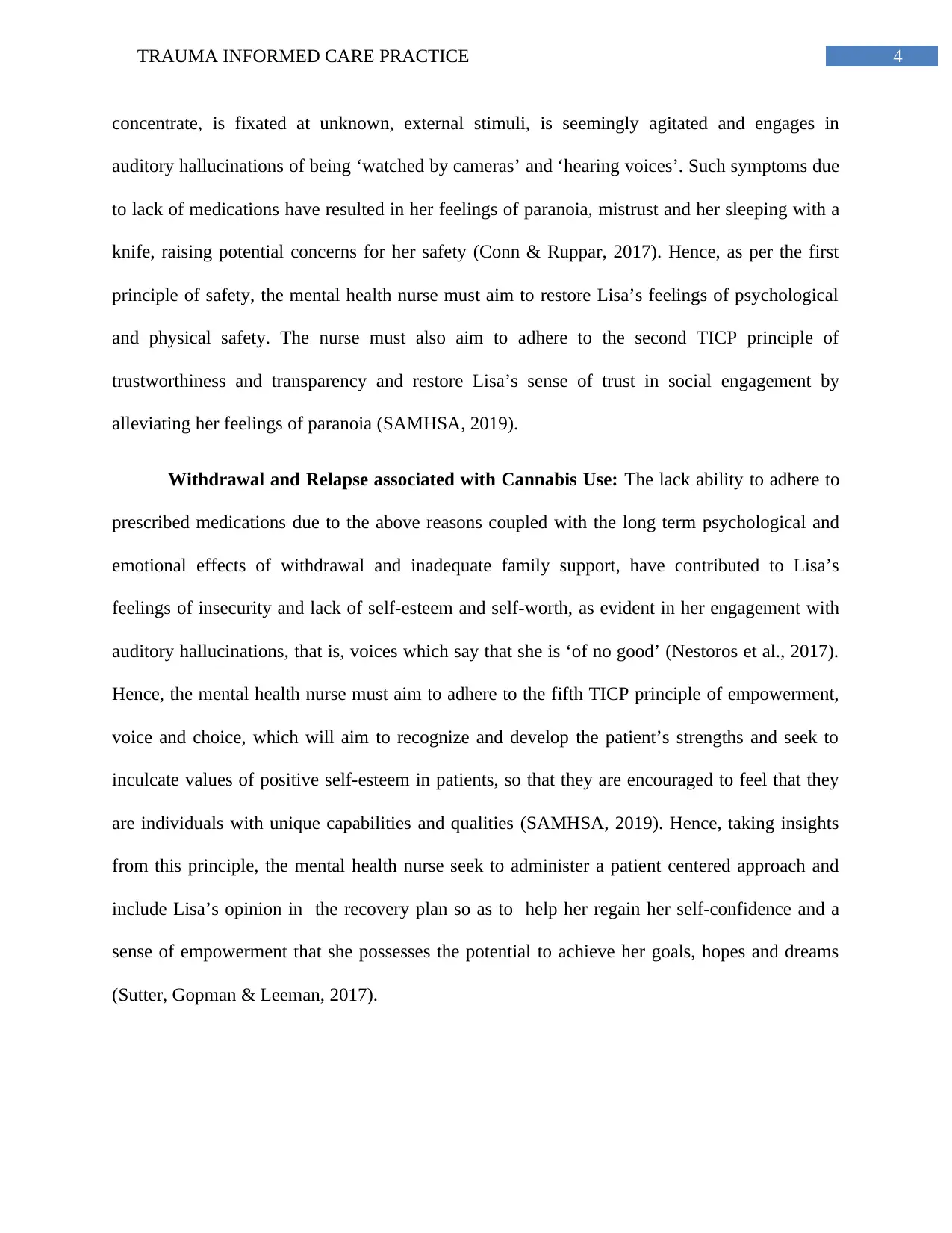
4TRAUMA INFORMED CARE PRACTICE
concentrate, is fixated at unknown, external stimuli, is seemingly agitated and engages in
auditory hallucinations of being ‘watched by cameras’ and ‘hearing voices’. Such symptoms due
to lack of medications have resulted in her feelings of paranoia, mistrust and her sleeping with a
knife, raising potential concerns for her safety (Conn & Ruppar, 2017). Hence, as per the first
principle of safety, the mental health nurse must aim to restore Lisa’s feelings of psychological
and physical safety. The nurse must also aim to adhere to the second TICP principle of
trustworthiness and transparency and restore Lisa’s sense of trust in social engagement by
alleviating her feelings of paranoia (SAMHSA, 2019).
Withdrawal and Relapse associated with Cannabis Use: The lack ability to adhere to
prescribed medications due to the above reasons coupled with the long term psychological and
emotional effects of withdrawal and inadequate family support, have contributed to Lisa’s
feelings of insecurity and lack of self-esteem and self-worth, as evident in her engagement with
auditory hallucinations, that is, voices which say that she is ‘of no good’ (Nestoros et al., 2017).
Hence, the mental health nurse must aim to adhere to the fifth TICP principle of empowerment,
voice and choice, which will aim to recognize and develop the patient’s strengths and seek to
inculcate values of positive self-esteem in patients, so that they are encouraged to feel that they
are individuals with unique capabilities and qualities (SAMHSA, 2019). Hence, taking insights
from this principle, the mental health nurse seek to administer a patient centered approach and
include Lisa’s opinion in the recovery plan so as to help her regain her self-confidence and a
sense of empowerment that she possesses the potential to achieve her goals, hopes and dreams
(Sutter, Gopman & Leeman, 2017).
concentrate, is fixated at unknown, external stimuli, is seemingly agitated and engages in
auditory hallucinations of being ‘watched by cameras’ and ‘hearing voices’. Such symptoms due
to lack of medications have resulted in her feelings of paranoia, mistrust and her sleeping with a
knife, raising potential concerns for her safety (Conn & Ruppar, 2017). Hence, as per the first
principle of safety, the mental health nurse must aim to restore Lisa’s feelings of psychological
and physical safety. The nurse must also aim to adhere to the second TICP principle of
trustworthiness and transparency and restore Lisa’s sense of trust in social engagement by
alleviating her feelings of paranoia (SAMHSA, 2019).
Withdrawal and Relapse associated with Cannabis Use: The lack ability to adhere to
prescribed medications due to the above reasons coupled with the long term psychological and
emotional effects of withdrawal and inadequate family support, have contributed to Lisa’s
feelings of insecurity and lack of self-esteem and self-worth, as evident in her engagement with
auditory hallucinations, that is, voices which say that she is ‘of no good’ (Nestoros et al., 2017).
Hence, the mental health nurse must aim to adhere to the fifth TICP principle of empowerment,
voice and choice, which will aim to recognize and develop the patient’s strengths and seek to
inculcate values of positive self-esteem in patients, so that they are encouraged to feel that they
are individuals with unique capabilities and qualities (SAMHSA, 2019). Hence, taking insights
from this principle, the mental health nurse seek to administer a patient centered approach and
include Lisa’s opinion in the recovery plan so as to help her regain her self-confidence and a
sense of empowerment that she possesses the potential to achieve her goals, hopes and dreams
(Sutter, Gopman & Leeman, 2017).
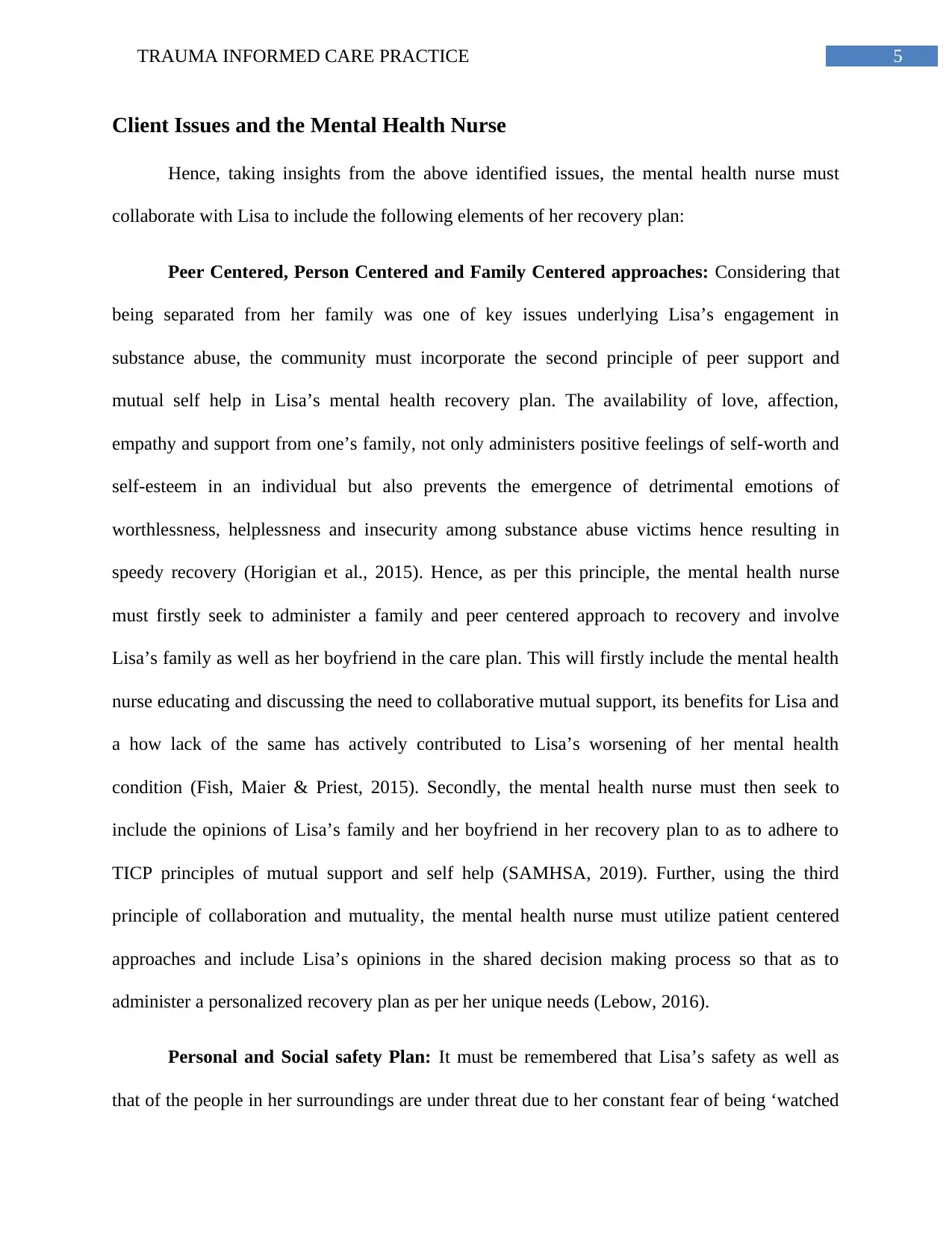
5TRAUMA INFORMED CARE PRACTICE
Client Issues and the Mental Health Nurse
Hence, taking insights from the above identified issues, the mental health nurse must
collaborate with Lisa to include the following elements of her recovery plan:
Peer Centered, Person Centered and Family Centered approaches: Considering that
being separated from her family was one of key issues underlying Lisa’s engagement in
substance abuse, the community must incorporate the second principle of peer support and
mutual self help in Lisa’s mental health recovery plan. The availability of love, affection,
empathy and support from one’s family, not only administers positive feelings of self-worth and
self-esteem in an individual but also prevents the emergence of detrimental emotions of
worthlessness, helplessness and insecurity among substance abuse victims hence resulting in
speedy recovery (Horigian et al., 2015). Hence, as per this principle, the mental health nurse
must firstly seek to administer a family and peer centered approach to recovery and involve
Lisa’s family as well as her boyfriend in the care plan. This will firstly include the mental health
nurse educating and discussing the need to collaborative mutual support, its benefits for Lisa and
a how lack of the same has actively contributed to Lisa’s worsening of her mental health
condition (Fish, Maier & Priest, 2015). Secondly, the mental health nurse must then seek to
include the opinions of Lisa’s family and her boyfriend in her recovery plan to as to adhere to
TICP principles of mutual support and self help (SAMHSA, 2019). Further, using the third
principle of collaboration and mutuality, the mental health nurse must utilize patient centered
approaches and include Lisa’s opinions in the shared decision making process so that as to
administer a personalized recovery plan as per her unique needs (Lebow, 2016).
Personal and Social safety Plan: It must be remembered that Lisa’s safety as well as
that of the people in her surroundings are under threat due to her constant fear of being ‘watched
Client Issues and the Mental Health Nurse
Hence, taking insights from the above identified issues, the mental health nurse must
collaborate with Lisa to include the following elements of her recovery plan:
Peer Centered, Person Centered and Family Centered approaches: Considering that
being separated from her family was one of key issues underlying Lisa’s engagement in
substance abuse, the community must incorporate the second principle of peer support and
mutual self help in Lisa’s mental health recovery plan. The availability of love, affection,
empathy and support from one’s family, not only administers positive feelings of self-worth and
self-esteem in an individual but also prevents the emergence of detrimental emotions of
worthlessness, helplessness and insecurity among substance abuse victims hence resulting in
speedy recovery (Horigian et al., 2015). Hence, as per this principle, the mental health nurse
must firstly seek to administer a family and peer centered approach to recovery and involve
Lisa’s family as well as her boyfriend in the care plan. This will firstly include the mental health
nurse educating and discussing the need to collaborative mutual support, its benefits for Lisa and
a how lack of the same has actively contributed to Lisa’s worsening of her mental health
condition (Fish, Maier & Priest, 2015). Secondly, the mental health nurse must then seek to
include the opinions of Lisa’s family and her boyfriend in her recovery plan to as to adhere to
TICP principles of mutual support and self help (SAMHSA, 2019). Further, using the third
principle of collaboration and mutuality, the mental health nurse must utilize patient centered
approaches and include Lisa’s opinions in the shared decision making process so that as to
administer a personalized recovery plan as per her unique needs (Lebow, 2016).
Personal and Social safety Plan: It must be remembered that Lisa’s safety as well as
that of the people in her surroundings are under threat due to her constant fear of being ‘watched
⊘ This is a preview!⊘
Do you want full access?
Subscribe today to unlock all pages.

Trusted by 1+ million students worldwide
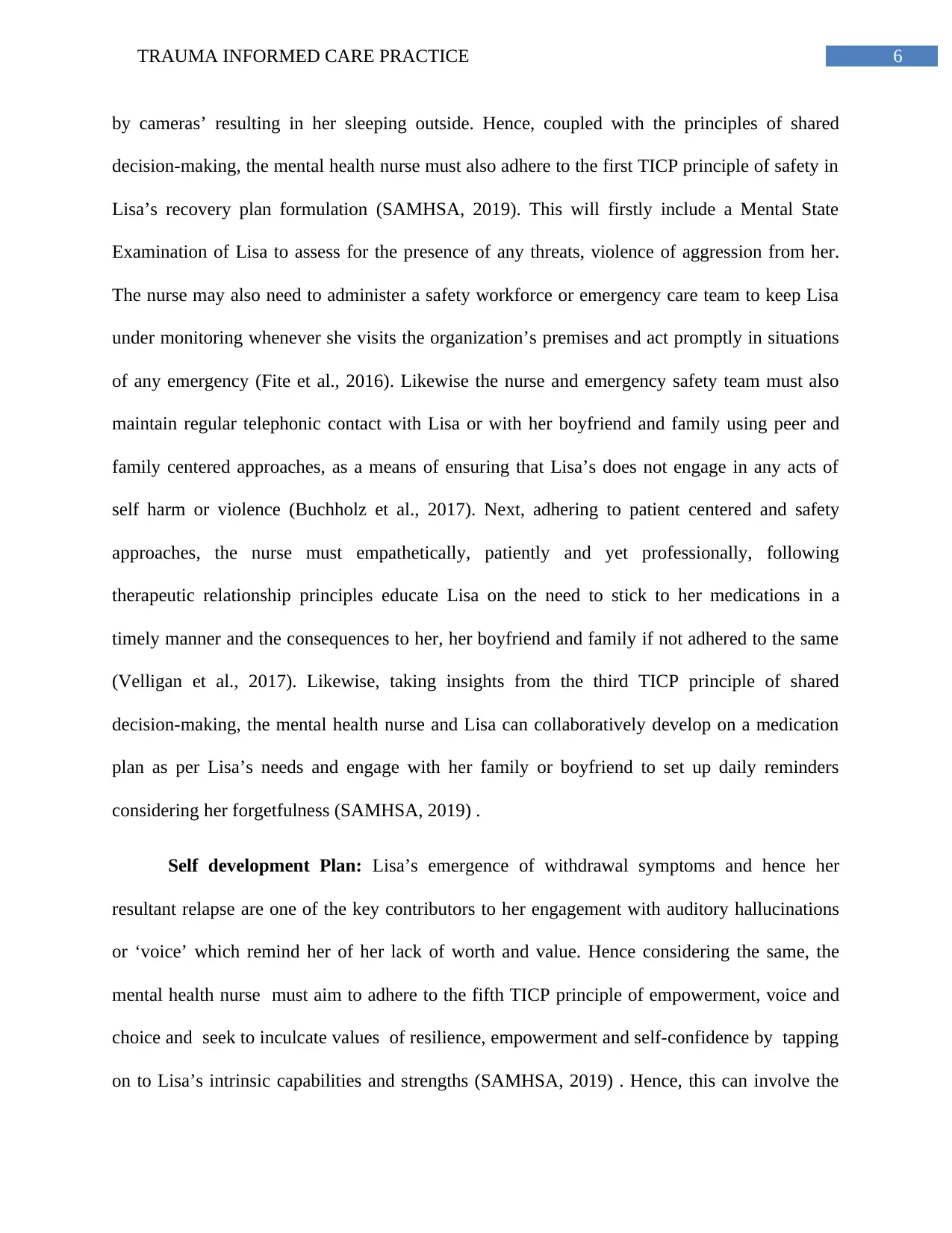
6TRAUMA INFORMED CARE PRACTICE
by cameras’ resulting in her sleeping outside. Hence, coupled with the principles of shared
decision-making, the mental health nurse must also adhere to the first TICP principle of safety in
Lisa’s recovery plan formulation (SAMHSA, 2019). This will firstly include a Mental State
Examination of Lisa to assess for the presence of any threats, violence of aggression from her.
The nurse may also need to administer a safety workforce or emergency care team to keep Lisa
under monitoring whenever she visits the organization’s premises and act promptly in situations
of any emergency (Fite et al., 2016). Likewise the nurse and emergency safety team must also
maintain regular telephonic contact with Lisa or with her boyfriend and family using peer and
family centered approaches, as a means of ensuring that Lisa’s does not engage in any acts of
self harm or violence (Buchholz et al., 2017). Next, adhering to patient centered and safety
approaches, the nurse must empathetically, patiently and yet professionally, following
therapeutic relationship principles educate Lisa on the need to stick to her medications in a
timely manner and the consequences to her, her boyfriend and family if not adhered to the same
(Velligan et al., 2017). Likewise, taking insights from the third TICP principle of shared
decision-making, the mental health nurse and Lisa can collaboratively develop on a medication
plan as per Lisa’s needs and engage with her family or boyfriend to set up daily reminders
considering her forgetfulness (SAMHSA, 2019) .
Self development Plan: Lisa’s emergence of withdrawal symptoms and hence her
resultant relapse are one of the key contributors to her engagement with auditory hallucinations
or ‘voice’ which remind her of her lack of worth and value. Hence considering the same, the
mental health nurse must aim to adhere to the fifth TICP principle of empowerment, voice and
choice and seek to inculcate values of resilience, empowerment and self-confidence by tapping
on to Lisa’s intrinsic capabilities and strengths (SAMHSA, 2019) . Hence, this can involve the
by cameras’ resulting in her sleeping outside. Hence, coupled with the principles of shared
decision-making, the mental health nurse must also adhere to the first TICP principle of safety in
Lisa’s recovery plan formulation (SAMHSA, 2019). This will firstly include a Mental State
Examination of Lisa to assess for the presence of any threats, violence of aggression from her.
The nurse may also need to administer a safety workforce or emergency care team to keep Lisa
under monitoring whenever she visits the organization’s premises and act promptly in situations
of any emergency (Fite et al., 2016). Likewise the nurse and emergency safety team must also
maintain regular telephonic contact with Lisa or with her boyfriend and family using peer and
family centered approaches, as a means of ensuring that Lisa’s does not engage in any acts of
self harm or violence (Buchholz et al., 2017). Next, adhering to patient centered and safety
approaches, the nurse must empathetically, patiently and yet professionally, following
therapeutic relationship principles educate Lisa on the need to stick to her medications in a
timely manner and the consequences to her, her boyfriend and family if not adhered to the same
(Velligan et al., 2017). Likewise, taking insights from the third TICP principle of shared
decision-making, the mental health nurse and Lisa can collaboratively develop on a medication
plan as per Lisa’s needs and engage with her family or boyfriend to set up daily reminders
considering her forgetfulness (SAMHSA, 2019) .
Self development Plan: Lisa’s emergence of withdrawal symptoms and hence her
resultant relapse are one of the key contributors to her engagement with auditory hallucinations
or ‘voice’ which remind her of her lack of worth and value. Hence considering the same, the
mental health nurse must aim to adhere to the fifth TICP principle of empowerment, voice and
choice and seek to inculcate values of resilience, empowerment and self-confidence by tapping
on to Lisa’s intrinsic capabilities and strengths (SAMHSA, 2019) . Hence, this can involve the
Paraphrase This Document
Need a fresh take? Get an instant paraphrase of this document with our AI Paraphraser
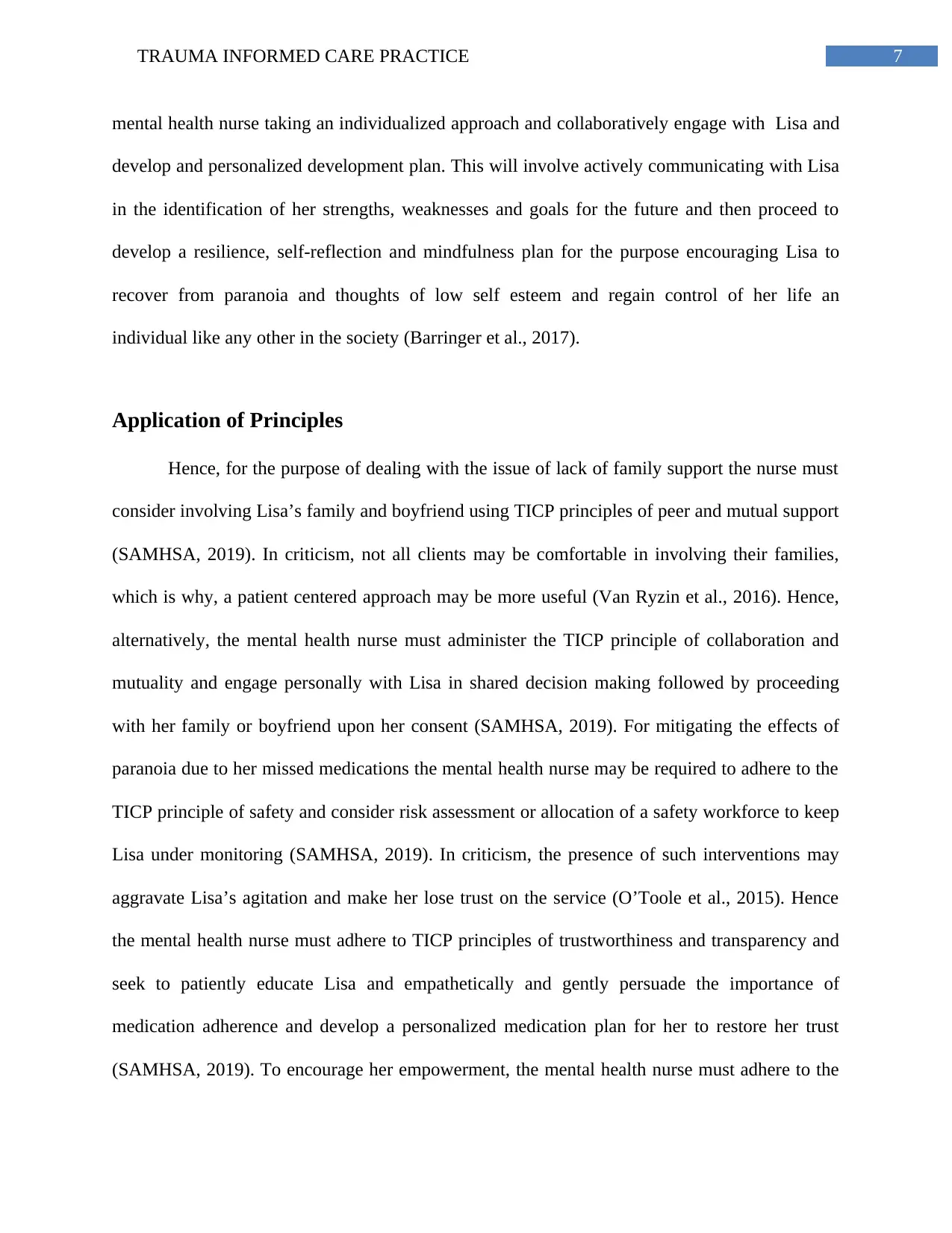
7TRAUMA INFORMED CARE PRACTICE
mental health nurse taking an individualized approach and collaboratively engage with Lisa and
develop and personalized development plan. This will involve actively communicating with Lisa
in the identification of her strengths, weaknesses and goals for the future and then proceed to
develop a resilience, self-reflection and mindfulness plan for the purpose encouraging Lisa to
recover from paranoia and thoughts of low self esteem and regain control of her life an
individual like any other in the society (Barringer et al., 2017).
Application of Principles
Hence, for the purpose of dealing with the issue of lack of family support the nurse must
consider involving Lisa’s family and boyfriend using TICP principles of peer and mutual support
(SAMHSA, 2019). In criticism, not all clients may be comfortable in involving their families,
which is why, a patient centered approach may be more useful (Van Ryzin et al., 2016). Hence,
alternatively, the mental health nurse must administer the TICP principle of collaboration and
mutuality and engage personally with Lisa in shared decision making followed by proceeding
with her family or boyfriend upon her consent (SAMHSA, 2019). For mitigating the effects of
paranoia due to her missed medications the mental health nurse may be required to adhere to the
TICP principle of safety and consider risk assessment or allocation of a safety workforce to keep
Lisa under monitoring (SAMHSA, 2019). In criticism, the presence of such interventions may
aggravate Lisa’s agitation and make her lose trust on the service (O’Toole et al., 2015). Hence
the mental health nurse must adhere to TICP principles of trustworthiness and transparency and
seek to patiently educate Lisa and empathetically and gently persuade the importance of
medication adherence and develop a personalized medication plan for her to restore her trust
(SAMHSA, 2019). To encourage her empowerment, the mental health nurse must adhere to the
mental health nurse taking an individualized approach and collaboratively engage with Lisa and
develop and personalized development plan. This will involve actively communicating with Lisa
in the identification of her strengths, weaknesses and goals for the future and then proceed to
develop a resilience, self-reflection and mindfulness plan for the purpose encouraging Lisa to
recover from paranoia and thoughts of low self esteem and regain control of her life an
individual like any other in the society (Barringer et al., 2017).
Application of Principles
Hence, for the purpose of dealing with the issue of lack of family support the nurse must
consider involving Lisa’s family and boyfriend using TICP principles of peer and mutual support
(SAMHSA, 2019). In criticism, not all clients may be comfortable in involving their families,
which is why, a patient centered approach may be more useful (Van Ryzin et al., 2016). Hence,
alternatively, the mental health nurse must administer the TICP principle of collaboration and
mutuality and engage personally with Lisa in shared decision making followed by proceeding
with her family or boyfriend upon her consent (SAMHSA, 2019). For mitigating the effects of
paranoia due to her missed medications the mental health nurse may be required to adhere to the
TICP principle of safety and consider risk assessment or allocation of a safety workforce to keep
Lisa under monitoring (SAMHSA, 2019). In criticism, the presence of such interventions may
aggravate Lisa’s agitation and make her lose trust on the service (O’Toole et al., 2015). Hence
the mental health nurse must adhere to TICP principles of trustworthiness and transparency and
seek to patiently educate Lisa and empathetically and gently persuade the importance of
medication adherence and develop a personalized medication plan for her to restore her trust
(SAMHSA, 2019). To encourage her empowerment, the mental health nurse must adhere to the
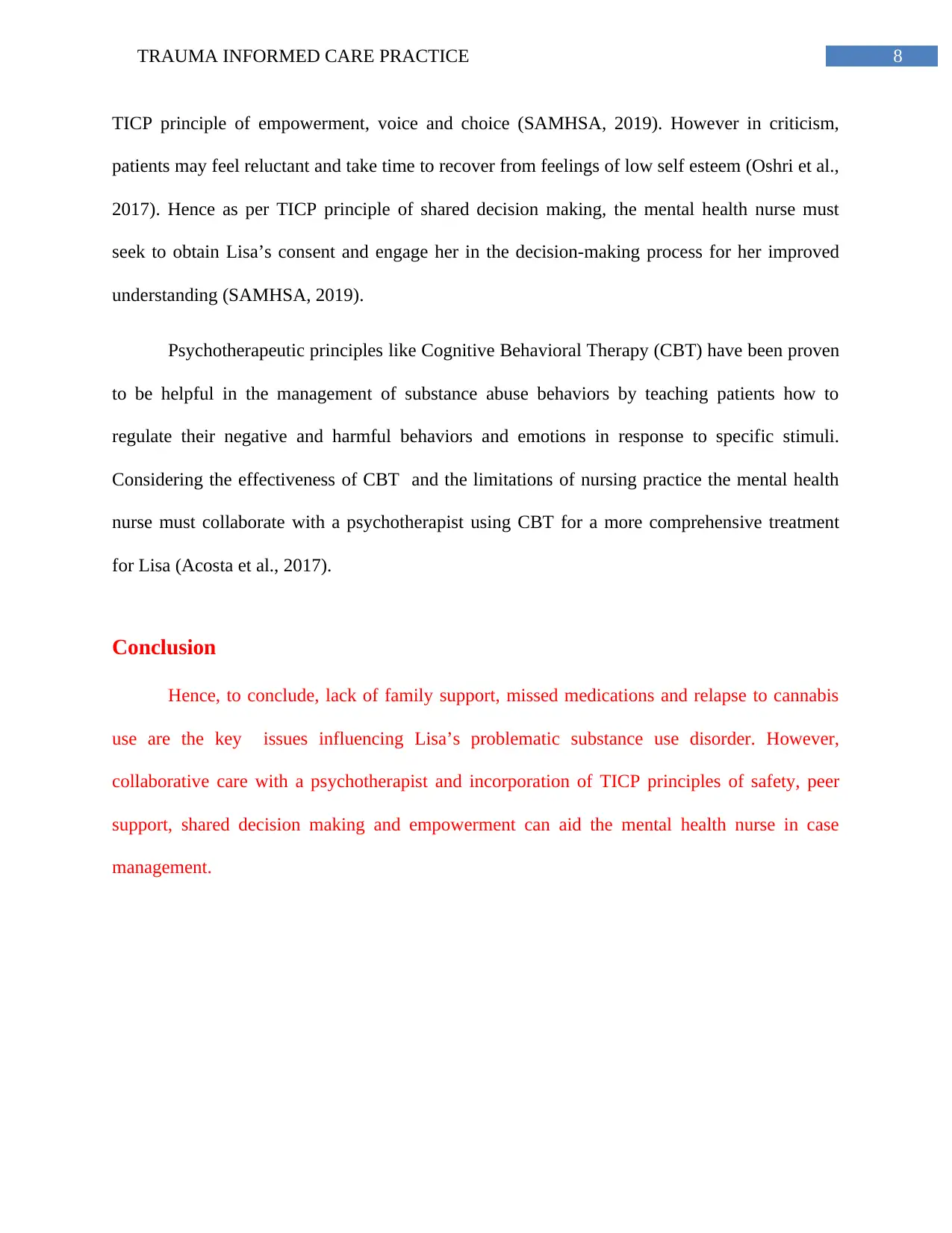
8TRAUMA INFORMED CARE PRACTICE
TICP principle of empowerment, voice and choice (SAMHSA, 2019). However in criticism,
patients may feel reluctant and take time to recover from feelings of low self esteem (Oshri et al.,
2017). Hence as per TICP principle of shared decision making, the mental health nurse must
seek to obtain Lisa’s consent and engage her in the decision-making process for her improved
understanding (SAMHSA, 2019).
Psychotherapeutic principles like Cognitive Behavioral Therapy (CBT) have been proven
to be helpful in the management of substance abuse behaviors by teaching patients how to
regulate their negative and harmful behaviors and emotions in response to specific stimuli.
Considering the effectiveness of CBT and the limitations of nursing practice the mental health
nurse must collaborate with a psychotherapist using CBT for a more comprehensive treatment
for Lisa (Acosta et al., 2017).
Conclusion
Hence, to conclude, lack of family support, missed medications and relapse to cannabis
use are the key issues influencing Lisa’s problematic substance use disorder. However,
collaborative care with a psychotherapist and incorporation of TICP principles of safety, peer
support, shared decision making and empowerment can aid the mental health nurse in case
management.
TICP principle of empowerment, voice and choice (SAMHSA, 2019). However in criticism,
patients may feel reluctant and take time to recover from feelings of low self esteem (Oshri et al.,
2017). Hence as per TICP principle of shared decision making, the mental health nurse must
seek to obtain Lisa’s consent and engage her in the decision-making process for her improved
understanding (SAMHSA, 2019).
Psychotherapeutic principles like Cognitive Behavioral Therapy (CBT) have been proven
to be helpful in the management of substance abuse behaviors by teaching patients how to
regulate their negative and harmful behaviors and emotions in response to specific stimuli.
Considering the effectiveness of CBT and the limitations of nursing practice the mental health
nurse must collaborate with a psychotherapist using CBT for a more comprehensive treatment
for Lisa (Acosta et al., 2017).
Conclusion
Hence, to conclude, lack of family support, missed medications and relapse to cannabis
use are the key issues influencing Lisa’s problematic substance use disorder. However,
collaborative care with a psychotherapist and incorporation of TICP principles of safety, peer
support, shared decision making and empowerment can aid the mental health nurse in case
management.
⊘ This is a preview!⊘
Do you want full access?
Subscribe today to unlock all pages.

Trusted by 1+ million students worldwide
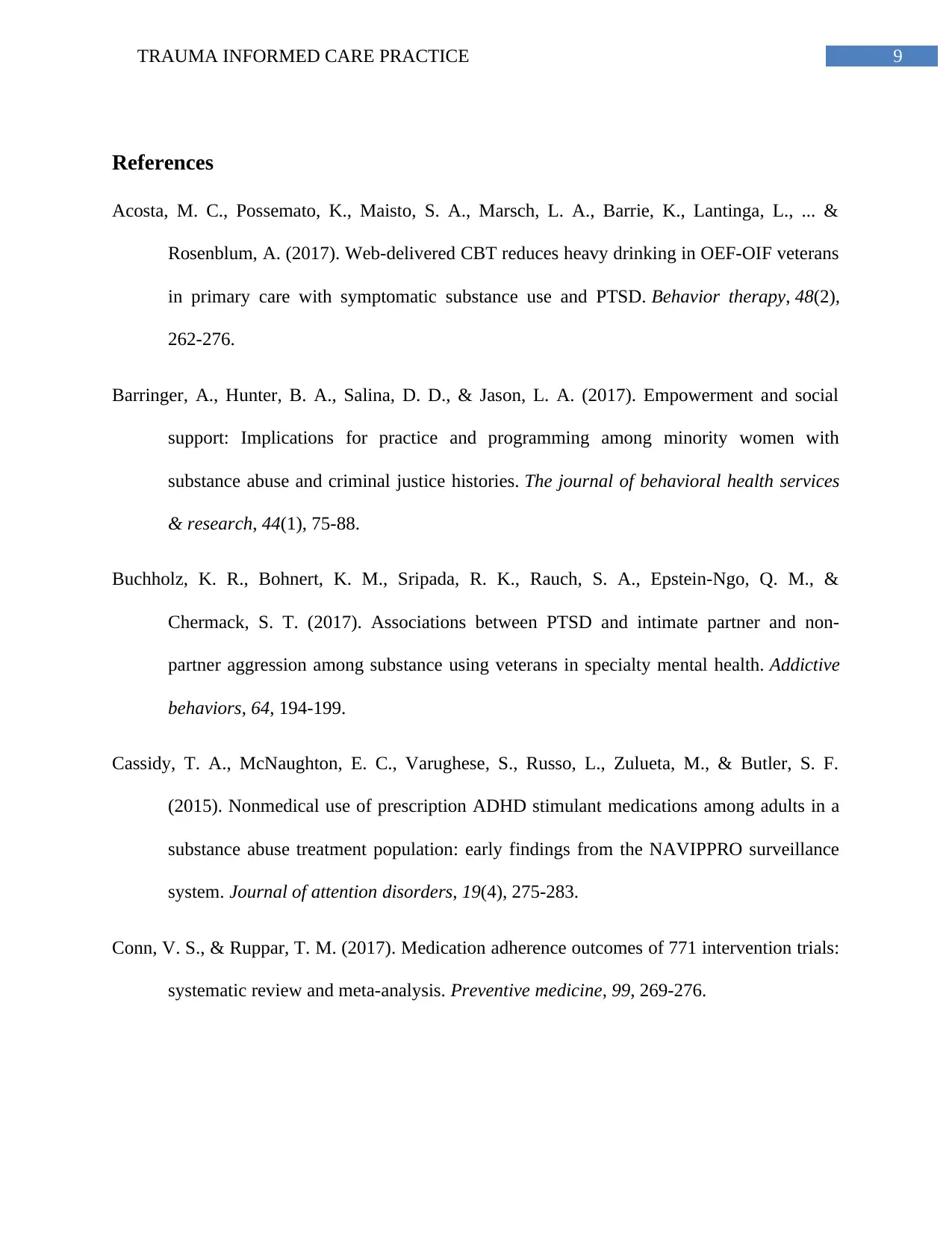
9TRAUMA INFORMED CARE PRACTICE
References
Acosta, M. C., Possemato, K., Maisto, S. A., Marsch, L. A., Barrie, K., Lantinga, L., ... &
Rosenblum, A. (2017). Web-delivered CBT reduces heavy drinking in OEF-OIF veterans
in primary care with symptomatic substance use and PTSD. Behavior therapy, 48(2),
262-276.
Barringer, A., Hunter, B. A., Salina, D. D., & Jason, L. A. (2017). Empowerment and social
support: Implications for practice and programming among minority women with
substance abuse and criminal justice histories. The journal of behavioral health services
& research, 44(1), 75-88.
Buchholz, K. R., Bohnert, K. M., Sripada, R. K., Rauch, S. A., Epstein-Ngo, Q. M., &
Chermack, S. T. (2017). Associations between PTSD and intimate partner and non-
partner aggression among substance using veterans in specialty mental health. Addictive
behaviors, 64, 194-199.
Cassidy, T. A., McNaughton, E. C., Varughese, S., Russo, L., Zulueta, M., & Butler, S. F.
(2015). Nonmedical use of prescription ADHD stimulant medications among adults in a
substance abuse treatment population: early findings from the NAVIPPRO surveillance
system. Journal of attention disorders, 19(4), 275-283.
Conn, V. S., & Ruppar, T. M. (2017). Medication adherence outcomes of 771 intervention trials:
systematic review and meta-analysis. Preventive medicine, 99, 269-276.
References
Acosta, M. C., Possemato, K., Maisto, S. A., Marsch, L. A., Barrie, K., Lantinga, L., ... &
Rosenblum, A. (2017). Web-delivered CBT reduces heavy drinking in OEF-OIF veterans
in primary care with symptomatic substance use and PTSD. Behavior therapy, 48(2),
262-276.
Barringer, A., Hunter, B. A., Salina, D. D., & Jason, L. A. (2017). Empowerment and social
support: Implications for practice and programming among minority women with
substance abuse and criminal justice histories. The journal of behavioral health services
& research, 44(1), 75-88.
Buchholz, K. R., Bohnert, K. M., Sripada, R. K., Rauch, S. A., Epstein-Ngo, Q. M., &
Chermack, S. T. (2017). Associations between PTSD and intimate partner and non-
partner aggression among substance using veterans in specialty mental health. Addictive
behaviors, 64, 194-199.
Cassidy, T. A., McNaughton, E. C., Varughese, S., Russo, L., Zulueta, M., & Butler, S. F.
(2015). Nonmedical use of prescription ADHD stimulant medications among adults in a
substance abuse treatment population: early findings from the NAVIPPRO surveillance
system. Journal of attention disorders, 19(4), 275-283.
Conn, V. S., & Ruppar, T. M. (2017). Medication adherence outcomes of 771 intervention trials:
systematic review and meta-analysis. Preventive medicine, 99, 269-276.
Paraphrase This Document
Need a fresh take? Get an instant paraphrase of this document with our AI Paraphraser
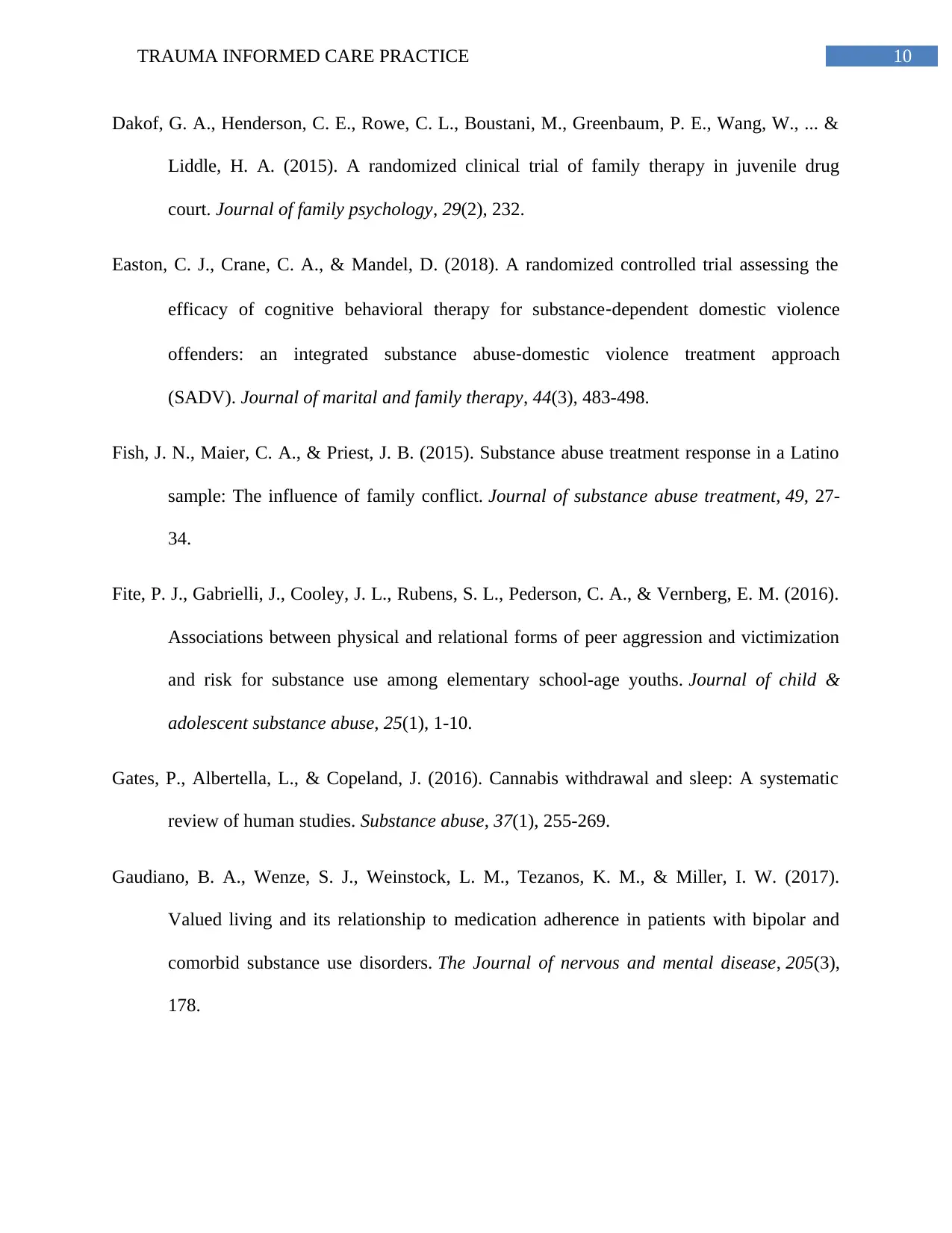
10TRAUMA INFORMED CARE PRACTICE
Dakof, G. A., Henderson, C. E., Rowe, C. L., Boustani, M., Greenbaum, P. E., Wang, W., ... &
Liddle, H. A. (2015). A randomized clinical trial of family therapy in juvenile drug
court. Journal of family psychology, 29(2), 232.
Easton, C. J., Crane, C. A., & Mandel, D. (2018). A randomized controlled trial assessing the
efficacy of cognitive behavioral therapy for substance‐dependent domestic violence
offenders: an integrated substance abuse‐domestic violence treatment approach
(SADV). Journal of marital and family therapy, 44(3), 483-498.
Fish, J. N., Maier, C. A., & Priest, J. B. (2015). Substance abuse treatment response in a Latino
sample: The influence of family conflict. Journal of substance abuse treatment, 49, 27-
34.
Fite, P. J., Gabrielli, J., Cooley, J. L., Rubens, S. L., Pederson, C. A., & Vernberg, E. M. (2016).
Associations between physical and relational forms of peer aggression and victimization
and risk for substance use among elementary school-age youths. Journal of child &
adolescent substance abuse, 25(1), 1-10.
Gates, P., Albertella, L., & Copeland, J. (2016). Cannabis withdrawal and sleep: A systematic
review of human studies. Substance abuse, 37(1), 255-269.
Gaudiano, B. A., Wenze, S. J., Weinstock, L. M., Tezanos, K. M., & Miller, I. W. (2017).
Valued living and its relationship to medication adherence in patients with bipolar and
comorbid substance use disorders. The Journal of nervous and mental disease, 205(3),
178.
Dakof, G. A., Henderson, C. E., Rowe, C. L., Boustani, M., Greenbaum, P. E., Wang, W., ... &
Liddle, H. A. (2015). A randomized clinical trial of family therapy in juvenile drug
court. Journal of family psychology, 29(2), 232.
Easton, C. J., Crane, C. A., & Mandel, D. (2018). A randomized controlled trial assessing the
efficacy of cognitive behavioral therapy for substance‐dependent domestic violence
offenders: an integrated substance abuse‐domestic violence treatment approach
(SADV). Journal of marital and family therapy, 44(3), 483-498.
Fish, J. N., Maier, C. A., & Priest, J. B. (2015). Substance abuse treatment response in a Latino
sample: The influence of family conflict. Journal of substance abuse treatment, 49, 27-
34.
Fite, P. J., Gabrielli, J., Cooley, J. L., Rubens, S. L., Pederson, C. A., & Vernberg, E. M. (2016).
Associations between physical and relational forms of peer aggression and victimization
and risk for substance use among elementary school-age youths. Journal of child &
adolescent substance abuse, 25(1), 1-10.
Gates, P., Albertella, L., & Copeland, J. (2016). Cannabis withdrawal and sleep: A systematic
review of human studies. Substance abuse, 37(1), 255-269.
Gaudiano, B. A., Wenze, S. J., Weinstock, L. M., Tezanos, K. M., & Miller, I. W. (2017).
Valued living and its relationship to medication adherence in patients with bipolar and
comorbid substance use disorders. The Journal of nervous and mental disease, 205(3),
178.
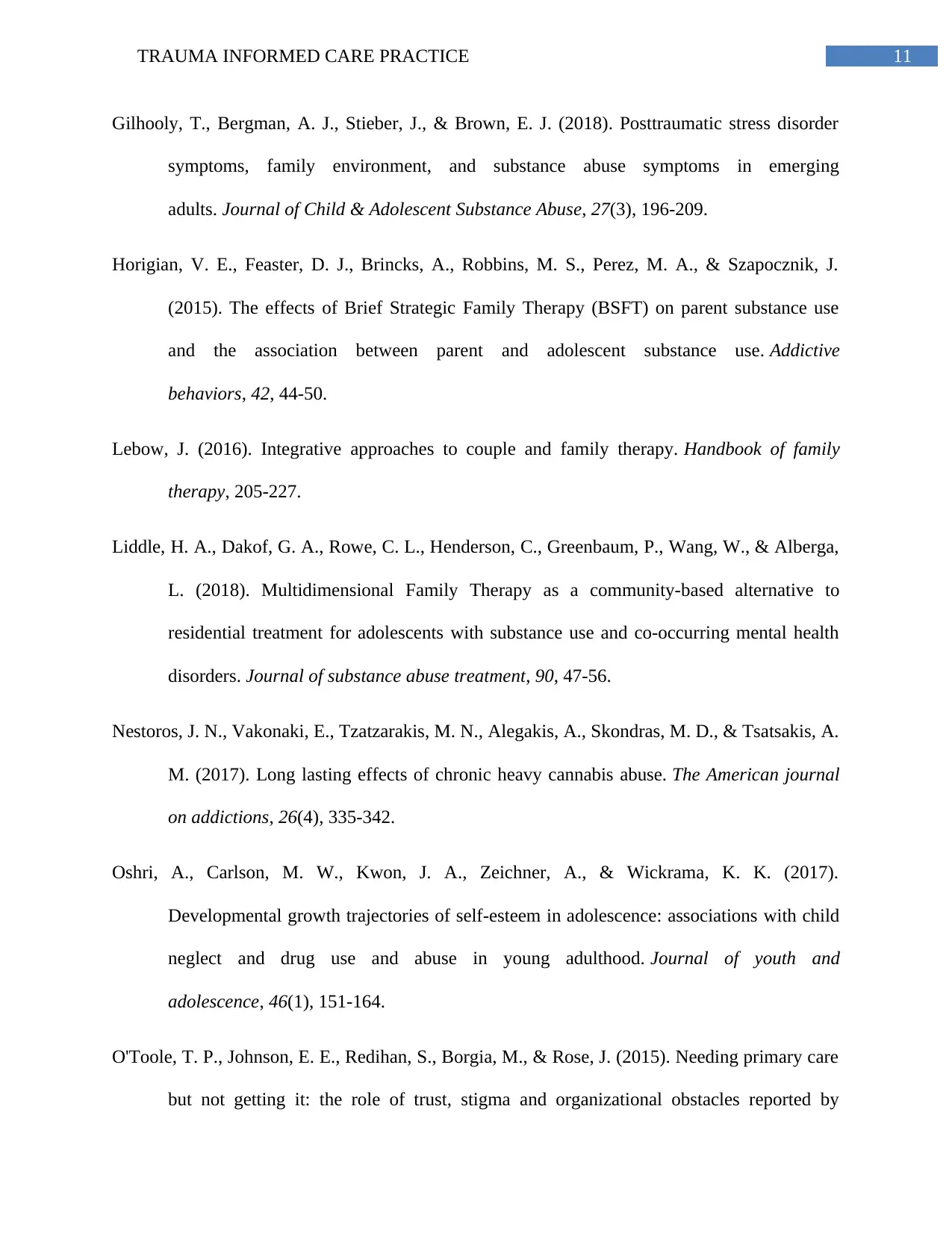
11TRAUMA INFORMED CARE PRACTICE
Gilhooly, T., Bergman, A. J., Stieber, J., & Brown, E. J. (2018). Posttraumatic stress disorder
symptoms, family environment, and substance abuse symptoms in emerging
adults. Journal of Child & Adolescent Substance Abuse, 27(3), 196-209.
Horigian, V. E., Feaster, D. J., Brincks, A., Robbins, M. S., Perez, M. A., & Szapocznik, J.
(2015). The effects of Brief Strategic Family Therapy (BSFT) on parent substance use
and the association between parent and adolescent substance use. Addictive
behaviors, 42, 44-50.
Lebow, J. (2016). Integrative approaches to couple and family therapy. Handbook of family
therapy, 205-227.
Liddle, H. A., Dakof, G. A., Rowe, C. L., Henderson, C., Greenbaum, P., Wang, W., & Alberga,
L. (2018). Multidimensional Family Therapy as a community-based alternative to
residential treatment for adolescents with substance use and co-occurring mental health
disorders. Journal of substance abuse treatment, 90, 47-56.
Nestoros, J. N., Vakonaki, E., Tzatzarakis, M. N., Alegakis, A., Skondras, M. D., & Tsatsakis, A.
M. (2017). Long lasting effects of chronic heavy cannabis abuse. The American journal
on addictions, 26(4), 335-342.
Oshri, A., Carlson, M. W., Kwon, J. A., Zeichner, A., & Wickrama, K. K. (2017).
Developmental growth trajectories of self-esteem in adolescence: associations with child
neglect and drug use and abuse in young adulthood. Journal of youth and
adolescence, 46(1), 151-164.
O'Toole, T. P., Johnson, E. E., Redihan, S., Borgia, M., & Rose, J. (2015). Needing primary care
but not getting it: the role of trust, stigma and organizational obstacles reported by
Gilhooly, T., Bergman, A. J., Stieber, J., & Brown, E. J. (2018). Posttraumatic stress disorder
symptoms, family environment, and substance abuse symptoms in emerging
adults. Journal of Child & Adolescent Substance Abuse, 27(3), 196-209.
Horigian, V. E., Feaster, D. J., Brincks, A., Robbins, M. S., Perez, M. A., & Szapocznik, J.
(2015). The effects of Brief Strategic Family Therapy (BSFT) on parent substance use
and the association between parent and adolescent substance use. Addictive
behaviors, 42, 44-50.
Lebow, J. (2016). Integrative approaches to couple and family therapy. Handbook of family
therapy, 205-227.
Liddle, H. A., Dakof, G. A., Rowe, C. L., Henderson, C., Greenbaum, P., Wang, W., & Alberga,
L. (2018). Multidimensional Family Therapy as a community-based alternative to
residential treatment for adolescents with substance use and co-occurring mental health
disorders. Journal of substance abuse treatment, 90, 47-56.
Nestoros, J. N., Vakonaki, E., Tzatzarakis, M. N., Alegakis, A., Skondras, M. D., & Tsatsakis, A.
M. (2017). Long lasting effects of chronic heavy cannabis abuse. The American journal
on addictions, 26(4), 335-342.
Oshri, A., Carlson, M. W., Kwon, J. A., Zeichner, A., & Wickrama, K. K. (2017).
Developmental growth trajectories of self-esteem in adolescence: associations with child
neglect and drug use and abuse in young adulthood. Journal of youth and
adolescence, 46(1), 151-164.
O'Toole, T. P., Johnson, E. E., Redihan, S., Borgia, M., & Rose, J. (2015). Needing primary care
but not getting it: the role of trust, stigma and organizational obstacles reported by
⊘ This is a preview!⊘
Do you want full access?
Subscribe today to unlock all pages.

Trusted by 1+ million students worldwide
1 out of 14
Related Documents
Your All-in-One AI-Powered Toolkit for Academic Success.
+13062052269
info@desklib.com
Available 24*7 on WhatsApp / Email
![[object Object]](/_next/static/media/star-bottom.7253800d.svg)
Unlock your academic potential
Copyright © 2020–2026 A2Z Services. All Rights Reserved. Developed and managed by ZUCOL.





